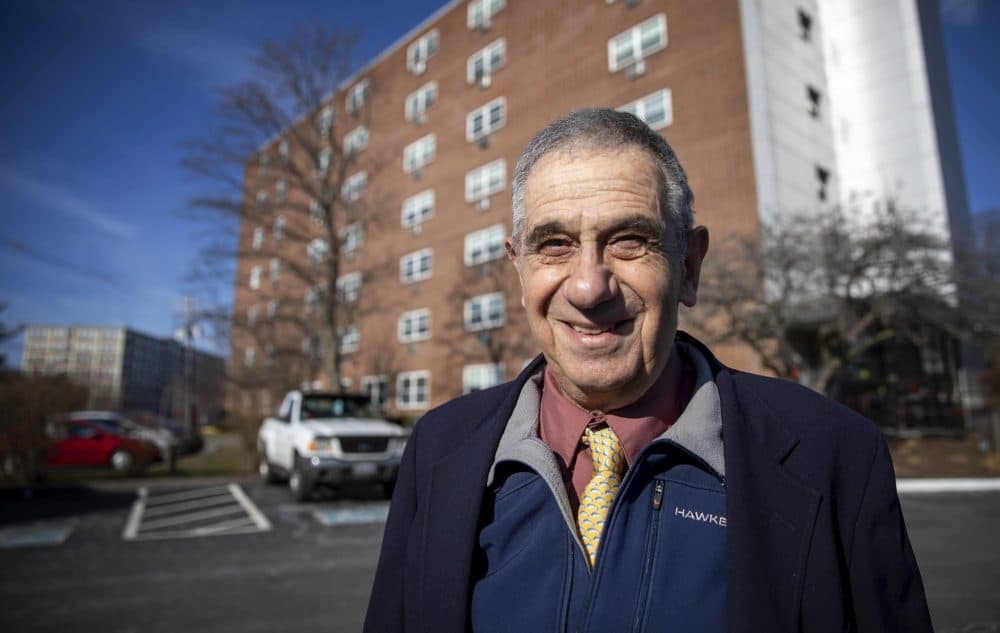Advertisement
Coronavirus Coverage
'Forgotten' Seniors In Mass. Low-Income Housing Get Their Place In The Coronavirus Vaccine Line
Resume
Jerry Halberstadt, a tenants' rights advocate who has fought bullying in low-income housing, is focused on a different concern these days.
"I’m 84, and unlikely to survive COVID if I get it, so I need to keep myself safe," he said. "I’m concerned about the same danger facing 92,000 tenants in public and subsidized housing all over the state."
He worries when neighbors in the building for senior and disabled residents where he lives, in central Peabody on the North Shore, don’t follow rules about wearing masks or maintaining distance in the small elevator or tight hallways. And in the current surge, the risk has grown.
"We need the vaccine now," Halberstadt said. "An additional shield — so we have a chance to live a normal life."
“Now” is not going to happen. Among the state's elderly populations, the vaccines are currently going only to those in what’s considered long-term care: nursing homes, assisted living and rest homes.
But soon has just become possible. On Wednesday, state officials announced that about 160,000 residents and staff of private and public low-income housing would be able to get vaccinated at the start of the next phase of distribution, which is slated to begin next month.
Health and Human Services Secretary Marylou Sudders said the addition of seniors in low-income housing aimed "to further protect vulnerable populations and ensure equitable distribution of the COVID-19 vaccine."
At the official announcement, senior housing leader Amy Schectman sounded the most upbeat notes heard during a state pandemic briefing since the updates began this spring.
"Thank you, Governor. Thank you, Secretary. Yay! I’m so happy!" she exulted from the podium.
Schectman runs 2Life Communities, a Boston-area chain of affordable senior housing where the average age is 82 and the residents’ median income is just $11,000 a year.
"This is just a really important milestone for older adults living in subsidized housing," she said. "They face a double threat from COVID by virtue of their age: They're more vulnerable to serious illness and death from the disease, and also more at risk for the dire consequences of social isolation."
Just As Vulnerable
When the state vaccination plan came out in early December, Schectman — and many colleagues — were surprised to see low-income senior housing left out. Especially because the residents tend to be just as vulnerable as those in assisted living — they just can’t afford assisted living. And many could qualify for nursing homes.
Schectman and dozens of public housing authority directors signed a letter asking Governor Charlie Baker and Secretary Sudders to include seniors in low-income housing in the first phase of vaccinations.
"And then we started working with our state legislators," Schectman said, "and our residents just started calling us, hundreds of calls a day. 'Are we getting it today? Are we getting it today? How are we going to get it?' And then their daughters started calling. And their granddaughters started calling, and crying and begging."
And fuming. Lindsey Dee from Westford found out in a Christmas Day phone call that her beloved 93-year-old grandmother in affordable housing in Newton was not in line for a vaccine, she said. And she saw red.
She started writing daily emails to Gov. Baker with a clear message: "Hey, this is wrong. It’s disgusting! It’s not right. And so you need to do something about it. Because it’s not just my grandmother, it’s almost everyone’s grandmother."
State officials have not explained why the initial vaccine plan left out seniors in low-income housing.
"You know, it’s a question I’ve asked," said Alex Corrales, who heads the Worcester Housing Authority. "I’m not sure that I’ve heard a really good answer yet."
He doesn’t agree, he said, but he has been told that public housing seniors are seen as living independently because they have their own apartments, "and so therefore, they’re not considered as high-risk compared to folks who are in a shared living environment."
Also, in contrast to nursing homes, the state hasn’t seen major outbreaks in senior low-income housing, "and so I think in some cases we’ve been a victim of that success," Corrales said.
He and other housing leaders say there’s also a general tendency for senior residents of low-income housing to be a forgotten population, stigmatized for their poverty and lacking clout.
"I’ve got folks with severe physical limitations or compromised immune systems," he said. "And so it really is the forgotten bunch. And my job is to keep reminding folks not to forget about the public housing residents."
Happily, now his job will also be to get all his senior housing residents and their staff vaccinated; Corrales says he’s already working with Worcester officials to set up the vaccination logistics for February.
Restoring Community Life
The affordable senior housing chain that Amy Schectman leads, 2Life Communities, is already starting vaccinations now in a pilot whose lessons will be shared, she said. At the first clinic this week, in Framingham, 100% of residents and staff got vaccinated, she said.
"What we're most looking forward to is restoring community life," she said at the official state announcement. "We’re so ready…"
Masking and distancing will still be needed for a while, Schectman said, but staff are already planning hundreds of activities for senior residents when they can finally, fully re-emerge.
This segment aired on January 15, 2021.
